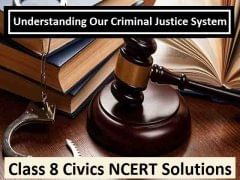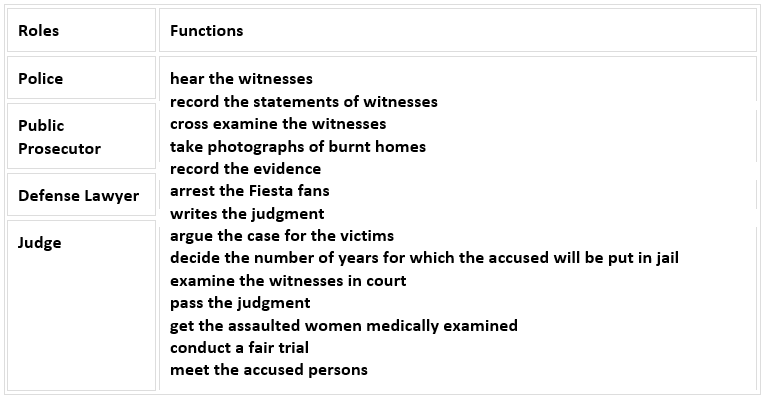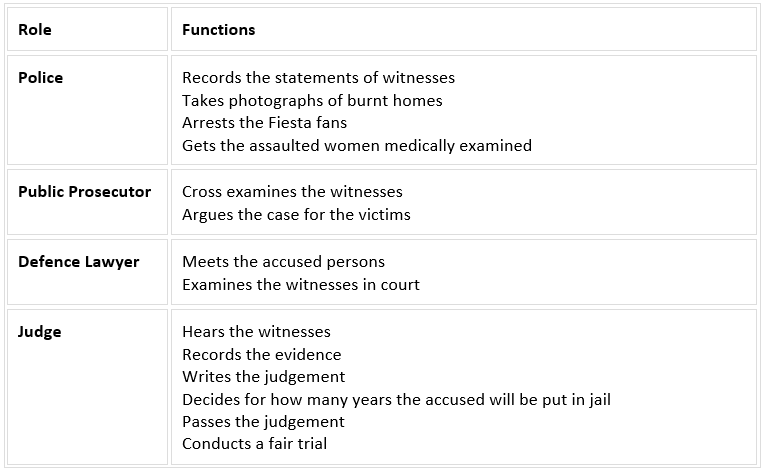NCERT Solutions for Class 8 Civics Chapter 6 - Understanding Our Criminal Justice System

In-Text Questions Solved
Q.1. Why do you think there is a rule that confessions made during police custody cannot be used as evidence against the accused?
Ans. Confessions made during police custody cannot be used as evidence against the accused because the accused could have confessed under pressure or by being beaten or tortured at the time of arrest, detention, and interrogation by the police.
Q.2. Now let us return to the story of Shanti and answer the following questions:
(a) When Shanti was arrested for theft, S.I. Rao also kept her brother Sushil in the police lock up for two days. Was it legal for the police to detain him? Does it violate the D.K. Basu guidelines?
(b) Did S.I. Rao do enough to question witnesses and compile evidence before arresting Shanti and filing a case against her? In keeping with the duties of the police as stated above, what else do you think S.I. Rao could have done as part of his investigation?
Ans. (a) It was not legal for the police to detain Sushil in the lock-up for two days. Yes, it violates the D.K. Basu guidelines.
(b) No, S.I. Rao did not do enough to question witnesses and compile evidence before arresting Shanti and filing a case against her.
As a part of the investigation S.I. Rao could have taken the following steps:
- Preparation of a memo of arrest at the time of arrest which includes the time and date of arrest. ,
- Taking the signature of one witness who could include a family member of Shanti.
- Providing information to a relative or friend of Shanti about, her arrest.
Q.3. Now let us take a slightly different scenario. Shanti and her brother Sushil go to the Police Station to complain that Mr Shinde’s 20-year old son had stolen `15,000 that they had been saving up. Do you think that the officer in charge of the Police Station will promptly lodge an FIR? List a few factors that in your opinion may influence the decision of the police to register or not register an FIR.
Ans. No, the officer-in-charge of the Police Station will not promptly lodge an FIR.
Following factors will influence the decision of the police not to register an FIR:
- Shanti is a mere maidservant and Sushil is a factory worker. While Mr. Shinde’s son belongs to a well-to-do family.
- Police officers may cross-question Shanti and Sushil.
Q.4. What did the judge say in Shanti’s case after hearing the testimony of all the witnesses?
Ans. The judge said that the police did not investigate Shanti’s case in a fair manner prosecution failed to prove that Shanti was guilty. This made Shanti innocent the judge showed enough evidence in favour of Shanti and finally acquitted her.
Q.5. All of the processes, written in bold on page 74, are crucial to a fair trial. Write in your own words what you understand of the following based on the above description of Shanti’s case.
(a) Open Court.
(b) Basis of Evidence.
(c) Cross-examination of Prosecution Witnesses.
Ans. (a) Open Court: The trial of Shanti’s case was held in public view. Shanti was also present there. Her brother, Mr. and Mrs. Shinde were there too to hear the case proceedings.
(b) Basis of Evidence: The defense lawyer collected proper evidence in the court to prove Shanti’s innocence. The court also gave an opportunity to Advocate Roy to present witnesses in Shanti’s defense.
(c) Cross-examination of Prosecution Witnesses: Shanti’s lawyer, Advocate Roy was given an opportunity to cross-examine all the prosecution witnesses.
Q.6. Discuss in class what might have happened in Shanti’s case if the following procedures had not been observed.
(a) If she were not defended by a lawyer
(b) If the court had not assumed her to be innocent.
Ans. (a) If she were not defended by a lawyer, she would not have been acquitted of the theft charge for a crime which was not committed by her and would have been sent to jail for a few months.
(b) If the court had not assumed her to be innocent, her case of theft would not had gone through the process of fair trial. Defense lawyer would have not been provided to her and the court would have sent her directly to the jail.
NCERT Textbook Questions Solved
Q.1. In a town called Peace Land, the supporters of the Fiesta football team learn that the supporters of the Jubilee football team in the nearby city about 40 km away have damaged the ground on which the Final between both teams is to be held the following day. A crowd of Fiesta fans armed with deadly weapons attacks the homes of the supporters of the Jubilee football team in the town. In the attack, 10 men are killed, 5 women are gravely hurt, many homes are destroyed and over 50 people injured.
Imagine that you and your classmates are now part of the criminal justice system. First divide the class into the following four groups of persons:
1. Police
2. Public Prosecutor
3. Defence Lawyer
4. Judge
The column on the right provides a list of functions. Match with the roles that are listed on the left. Have each group pick the functions that is needs to perform to bring justice to those who were affected by the violence of the Fiesta fans. In what order, will these functions be performed?
Now take the same situation but ask one student who is a supporter of the Fiesta Club to perform all the functions listed above. Do you think the victims would get justice if only one person performed all of the functions of the criminal justice system? Why not?
State two reasons why you believe that different persons need to play different roles as part of the criminal justice system.
Ans.

The victim would not get justice if only one person performs all the functions of the criminal justice system, because he could get influenced by various prejudices. Separation of power is necessary within a judicial system too, since absolute power can lead to unfairness.
Two reasons why different people need to play different roles as part of the criminal justice system are:
- All the aspects of trial and investigation cannot be conducted by a single person, as it entails a diverse range of work including arresting, recording the statements of witnesses, defending the victim and accused parties, passing a fair trial and judicially correct judgement.
- If all the powers are vested on one person alone, it might be misused and thereby violate the laws based on just and equal decision.
Q.2. Now take the same situation but ask one student who is a supporter of the Fiesta Club to perform all the functions listed above. Do you think the victims would get justice if only one person performed all of the functions of the criminal justice system ? Why not?
Ans. 1. Class be divided into groups and choose their answer profiles:
2. Because he would be influenced by several internal and external prejudices.
3. Two reasons:
- To avoid prejudices.
- Different levels of thinking and understanding.
- To give a fair trial.
Q.3. State two reasons why you believe that different persons need to play different roles as part of the criminal justice system.
Ans. Different persons need to play different roles as part of the criminal justice system:
- Different roles played by different persons need specific qualifications. So, this is not possible for a single person to perform the functions like arresting, defending, cross-questioning, collecting evidence, and giving final decision or judgment.
- Tb ensures that every citizen, irrespective of their class, caste, gender, religious and ideological backgrounds gets a fair trial in the case of being accused.
FAQs on NCERT Solutions for Class 8 Civics Chapter 6 - Understanding Our Criminal Justice System
| 1. What is the purpose of our criminal justice system? |  |
| 2. How does our criminal justice system work? |  |
| 3. What are the different components of our criminal justice system? |  |
| 4. How does our criminal justice system ensure fairness and justice? |  |
| 5. What are some challenges and criticisms of our criminal justice system? |  |















